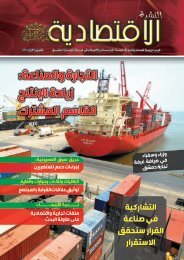SIGAR
2017-01-30qr
2017-01-30qr
Create successful ePaper yourself
Turn your PDF publications into a flip-book with our unique Google optimized e-Paper software.
ECONOMIC AND SOCIAL DEVELOPMENT<br />
regulations governing foreign-exchange-denominated loans, and banks’ risk<br />
aversion following the Kabul Bank crisis. 624<br />
In 2016, the Afghan government declared a dual strategy for financial<br />
sector reform by addressing weaknesses and providing for more robust<br />
banking regulation and oversight. This is to include risk-based audits and<br />
reviews, establishing a unit to monitor risks from state-owned banks, ensuring<br />
government oversight regulations are appropriate and not duplicative,<br />
providing incentives for banks to lend to private enterprises, and a financial<br />
inclusion strategy to improve customer access to banking services. 625<br />
Financial Action Task Force Compliance Update<br />
At its most recent plenary session in Paris, France, on October 19–21, 2016,<br />
the Financial Action Task Force (FATF) chose to keep Afghanistan on its<br />
“Improving Global Anti-Money Laundering/Combating the Financing of<br />
Terrorism (AML/CFT) Compliance” document, also known as the “gray list.”<br />
This means that while Afghanistan has strategic AML/CFT deficiencies, its<br />
government has developed an action plan, made a high-level political commitment<br />
to address those deficiencies, and is making progress. 626 This is the<br />
eighth consecutive FATF review in which Afghanistan has maintained this<br />
status since being downgraded to the “dark gray” list in February 2014. 627<br />
FATF said Afghanistan has improved its AML/CFT administration, and<br />
“nearly addressed the technical requirements of its action plan,” but still<br />
needs to show progress by providing additional information on its legal<br />
framework for identifying, tracing, and freezing terrorist assets. The U.S.<br />
Department of Treasury (Treasury) said this includes information on the<br />
compliance of Afghanistan’s AML/CFT laws by private sector financial institutions.<br />
FATF encouraged Afghanistan to further implement its action plan.<br />
Treasury said it remains concerned about the government’s ability to implement<br />
AML/CFT laws and reform, but reported that Afghanistan’s financial<br />
intelligence unit revoked the licenses of 95 money-service providers in<br />
Kabul and imposed $45,000 in fines for failure to comply with AML laws. 628<br />
Kabul Bank Theft Accountability—Reality Check<br />
As of December 19, 2016, Afghanistan’s Attorney General’s Office (AGO) has<br />
not acted on the 114 Kabul Bank-related cases currently referred to it. In<br />
a meeting with the U.S. Department of Justice (DOJ), the Afghan attorney<br />
general said he was disinclined to enforce or pursue current judgments or<br />
investigate the Kabul Bank case any further. 629 That statement directly contravened<br />
President Ghani’s October 2014 decree requiring the AGO to indict<br />
and prosecute all those involved in the approximately $987 million stolen<br />
from Kabul Bank, and to monitor enforcement of the courts’ decisions. 630<br />
The Kabul Bank Receivership (KBR), which is responsible for managing<br />
the bad assets (for example, loans that are not being repaid), said<br />
that the vague language used in the Special Appellate Court’s decision in<br />
Financial Action Task Force: an<br />
intergovernmental policy-making body that<br />
sets standards and promotes effective<br />
implementation of legal, regulatory, and<br />
operational measures for combating<br />
money laundering, terrorist financing, and<br />
other related threats to the integrity of<br />
the international financial system. Its 36<br />
members include the United States, United<br />
Kingdom, Switzerland, and the European<br />
Union; observers include the United<br />
Nations and the Asian Development Bank.<br />
Source: Financial Action Task Force website, “Who We Are,”<br />
and “Members and Observers,” accessed 1/3/2016.<br />
“Pursuing recovery of<br />
Kabul Bank assets and<br />
holding perpetrators<br />
accountable is a critical<br />
priority. This would signal<br />
a shift in governance and<br />
accountability of the<br />
banking sector.”<br />
Source: World Bank, Afghanistan Country Snapshot,<br />
10/2016, p. 1.<br />
REPORT TO THE UNITED STATES CONGRESS I JANUARY 30, 2017<br />
157







